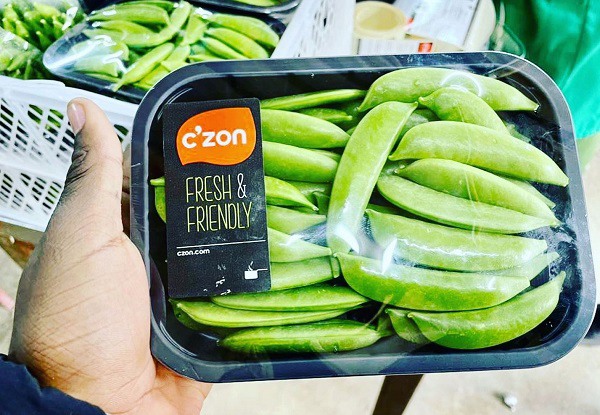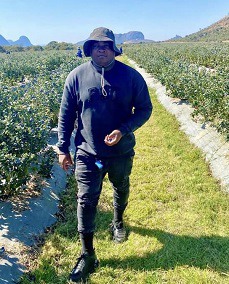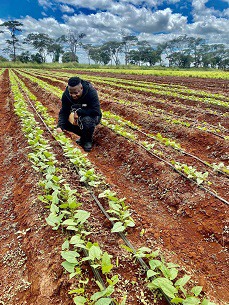During his recent two-week visit to mainland China ahead of Hong Kong Fruit Logistica, Clarence Mwale could find not a single whole orange in supermarkets in Shanghai. What he did see at the wholesale market were oranges from the USA, at a heady price.
In Hong Kong, a Chinese importer was looking for 80 containers of citrus but, he told Clarence, he could only get 17 containers this season.
“There’s still a huge demand for Zimbabwean citrus which we haven’t been able to fill,” Clarence says, noting that a couple of Zimbabwean citrus growers in Beitbridge have been approved to export to China, but current bilateral negotiations should pave the way for all Zimbabwean citrus growers.
“Fruit Logistica Hong Kong for me was a very pleasant surprise. I’m pretty sure we were the only Zimbabweans there and every time we introduced ourselves, everybody got excited. We received a very big welcome: they were surprised that we’d come all the way from Zimbabwe and everyone wanted to talk to us, particularly Chinese companies who are looking specifically for Zimbabwean citrus.”
Clarence represents a large number of small growers in Zimbabwe, some of whom have a hectare or two of citrus but collectively, they can amass significant tonnage.
Tuminda rapidly grows its European pea and bean exports
In the same way, the growers who make up Tuminda – a Shona word for a collective of small farms – have already entered the established Zimbabwean pea and bean export sector, this year sending over 400 tonnes of mangetout and sugar snap peas, and currently fine and superfine beans to supermarket groups like Lidl, Albert Heijn and C’zon in France.

In less than a year, Tuminda has grown to be Zimbabwe’s third biggest pea and bean exporter. At the beginning of the season prices justify flying peas out from Harare, but when volumes are sufficient and quality sound, they are trucked over two days to Cape Town, whence they are shipped to Europe.
“We’re probably the third biggest pea consolidator and supplier to Europe, still exporting into week 48 when many Zimbabwean pea producers will have ended. By then the weather is warmer which can affect quality, but no-one else is supplying at this time and the price makes it worth it.”
Mozambique’s ports have been in the news recently, but Maputo is too far for them and Beira doesn’t yet have the cold facilities they require, he says. “The quality has been very good, we’ve had no issues with complying with all of the EU’s requirements,” he remarks, which is not at all surprising: for fifteen years Clarence’s company Fair-Mark has been preparing companies for all of the major accreditation audits in Zimbabwe, across the border in Mozambique and in other African countries.
“The quality has been very good, we’ve had no issues with complying with all of the EU’s requirements,” he remarks, which is not at all surprising: for fifteen years Clarence’s company Fair-Mark has been preparing companies for all of the major accreditation audits in Zimbabwe, across the border in Mozambique and in other African countries.
Right: Clarence Mwale in a blueberry field near Mvurwi, Zimbabwe
Later this year Tuminda will market the litchis and mangoes from Mozambican small-scale growers.
Through criss-crossing the region Clarence has gained a profound overview of Zimbabwean agriculture, emerging as a leading proponent of agricultural revival in the country which he’s been sharing at international trade shows.
Having already visited Europe, Middle East and Asia this year, he will next be at the Intra-African Trade Fair in Egypt in November.
“We’re always looking for new markets,” he emphasises.
By winter 2024 the plan is to collect the produce from their thousands of growers – he’s aiming at involving 5,000 by next year - and sort, grade and pack their peas and beans at Tuminda’s own packhouse, currently under construction, and located close to Harare. It will have the capacity to pack 50 tonnes of different lines of fresh fruit and vegetables per day.
Offtake agreements were missing link “Our model is to change the livelihoods of small farmers who before didn’t have opportunity to export. Tuminda provides them with an offtake agreement on which basis banks then agree to give these growers bank loans. Offtake agreements have for many years been the missing link.”
“Our model is to change the livelihoods of small farmers who before didn’t have opportunity to export. Tuminda provides them with an offtake agreement on which basis banks then agree to give these growers bank loans. Offtake agreements have for many years been the missing link.”
Right: newly planted fine beans
He recently told the Zimbabwean TV channel NRTV that small-scale farmers have not had many companies willing to look at them. “We chose small-scale farmers because no-one else is choosing them. It’s hard work: we’ve decided to take that hard work and make it our problem.”
He sees Tuminda’s mission as a humanitarian one. “If we can work with 5,000 farmers and send a few hundred people to school we would have achieved our goal, more than anything.”
Tuminda’s Harare office is busy with potential growers, reflecting the improved business environment in Zimbabwe.
“I think in Zimbabwe things have only changed for the better. There’s a lot of production and a lot of positivity.”
He admits that there was some trepidation in the run-up to Zimbabwe’s recent elections (not unfounded, given their election history over the past twenty years).

Mangetout and sugar snap pea farmer Jane Mugwira with Clarence Mwale
“I think people have learned to accept that politics should not affect business,” he says. “There’s still a lot of politics to fix but in terms of business and farming, I think it has changed for the better in Zimbabwe. Banks never used to lend people money: now they do. Farmers can get support, you can go into a dealership and buy irrigation equipment on credit.” For more information:
For more information:
Clarence Mwale
Tuminda
Tel: +263 772 929 941
Email: info@tuminda.co.zw
https://www.tuminda.co.zw/
